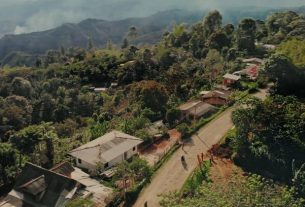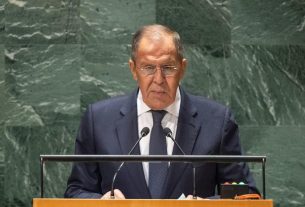Humanitarian and Resident Coordinator Marcoluigi Corsi expressed the UN’s profound sorry at the immense loss of life stemming from Friday’s 7.7 and 6.4 magnitude quakes with the death toll rising to around 2,000, according to the country’s military junta.
“The latest reports indicate significant loss of life, widespread injuries, and many still unaccounted for as rescue operations continue,” Mr. Corsi said in a statement on behalf of the UN Country Team.
Urgent support operation continues
He stressed that the UN and partners continue to urgently mobilise in support of the emergency response, standing ready to assist all communities “wherever they are”.
The earthquakes struck near Mandalay and Sagaing, with impacts felt across Bago, Magway, Nay Pyi Taw, and parts of Shan State. Hospitals are overwhelmed, while communication and transport routes have been severely disrupted.
Thousands are sleeping in the open, fearful of aftershocks and unable to return to damaged homes.
UN-facilitated rescue teams from around 20 countries, including sniffer dogs, paramedics and medical supplies, supported by millions of dollars in aid, continue to arrive in Myanmar – where millions were already displaced by civil war, arising from the military coup of February 2021.
Resilience further eroded
“Even before this earthquake, nearly 20 million people in Myanmar were in need of humanitarian assistance,” Mr. Corsi emphasized. “This latest tragedy compounds an already dire crisis and risks further eroding the resilience of communities already battered by conflict, displacement, and past disasters.”
The UN Humanitarian Country Team is actively conducting rapid needs assessment missions in coordination with UN agencies, humanitarian partners, local authorities and community-based organizations, paying particular attention to the needs of women, children, the elderly, and people with disabilities, who are disproportionately affected in such disasters.
“Beyond the immediate response, this crisis highlights the urgent need to strengthen efforts towards recovery and to invest in measures that help communities withstand future shocks,” Mr. Corsi said.
Significant UN presence
An initial $15 million in emergency funds has been allocated by the UN to support the lifesaving response. Medical teams, shelter materials, and critical water, sanitation and hygiene (WASH) items are arriving – alongside prepositioned and supplementary food aid.
“We have a significant presence in Mandalay and surrounding areas, and we are doing everything we can to reach people in need despite serious logistical challenges,” Mr. Corsi said. “But much more will be required in the days and weeks ahead.”
More than ever, timely support is critical to prevent further deterioration of the crisis, he added.
The World Food Programme (WFP) reported that it aims to support 100,000 of the worst hit with ready-to-eat meals, following by food and cash-for-food assistance to around 800,000 for the next month.
Severe damage to Naypyidaw’s road infrastructure following the earthquake in Myanmar.
Ceasefire now: UN Special Envoy
The UN Special Envoy on Myanmar Julie Bishop issued a statement on Monday saying she stands in solidarity with the people of Myanmar.
“The earthquake has laid bare the deeper vulnerabilities facing Myanmar’s people and underscored the need for sustained international attention to the broader crisis.”
Referencing the ongoing conflict which has seen military forces lose control of a majority of the country to opposition armed groups amid brutal fighting and airstrikes, she said that “all sides must urgently allow space for humanitarian relief and ensure that aid workers can operate in safety.”
Continuing military operations in quake-affected areas “risks further loss of life and undermines the shared imperative to respond,” she continued.
Ms. Bishop called for an immediate ceasefire by all parties, to prioritise the rescue, aid and recovery effort, including protection of civilians.
She said she was in close contact with Emergency Relief Coordinator Tom Fletcher and the UN Country Team in Myanmar who are working in partnership with neighboring countries and others, supported by the UN’s regional and global network.


